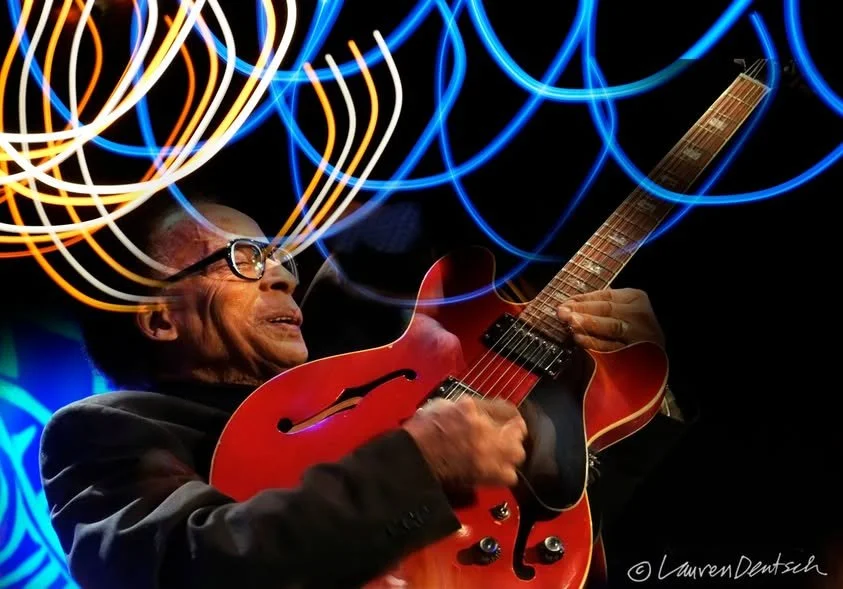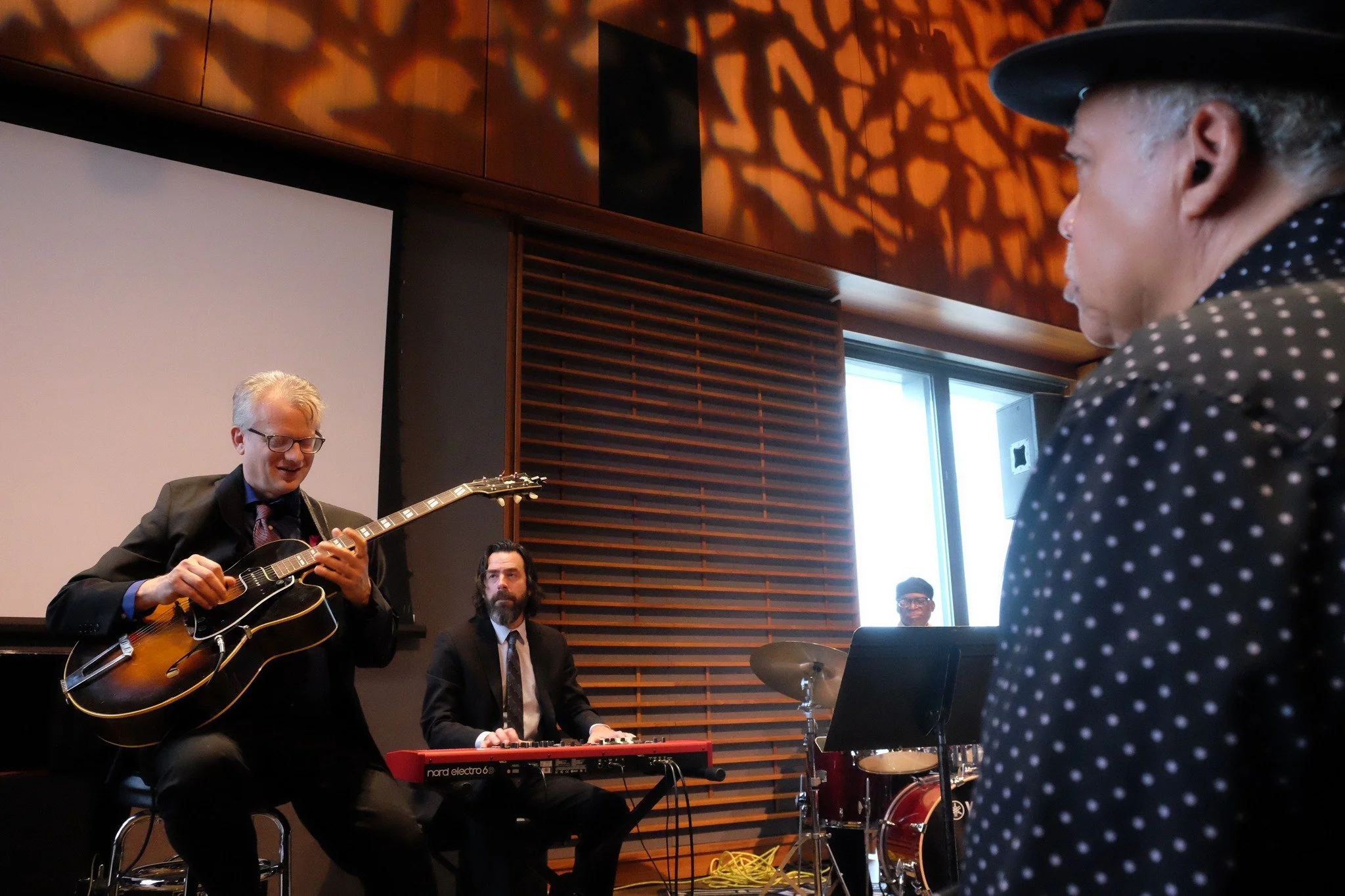George!
George the Bomb! (Photograph taken and artistically enhanced by Lauren Deutsch)
Time: Tuesday, April 8
Place: St. Moses the Black Parish Ministry Center, 7749 South Vernon
Everybody Loves George…and Mama Sunshine!
On stage, Von Freeman’s first, middle, and last commandments were solid: Express Yourself!
Off stage, even outside his house after a snowstorm, Vonski’s Rules of Order forbade anyone, even guitarist Mike Allemana, – who played in the saxophonist’s quartet from 1992 until his death in 2012 – from helping him move any gear from the front door to the ride waiting for him.
Even with streets and sidewalks swallowed whole by the snowstorm, Allemana waited as the seasoned citizen struggled through the snow. He waited, watched, and worried.
Allemana’s peace would then be busted wide open by the following moment:
“I see George (Von’s brother,) in a silk, leopard-skin robe and slippers in the snow,” he recalled. “And he comes out and says, ‘What are you doing out here? You gotta help the old man!’ He’s screaming at me….”
Embarrassed, Allemana tried to explain what big brother had commanded, but he, instead, did what George suggested. “Once inside the car,” he continued, “Von laughed and said, ‘Ah, don’t pay George no mind. He’s a fighter, right?’ ”
Allemana recalled this life lesson at the South Side Jazz Coalition’s (SSJC) Second Tuesday Jazz Jam, held seven days after George Freeman passed away at age 97. This evening’s remembrances – which also honored Dorothy “Mama Sunshine” Lyles, a cultural warrior who passed away on April 5 at age 77 – were shared after pianist Roger Harris and his quartet played their first set.
George Freeman’s 80-year career in music began when he and his band played at the Pershing Hotel on Cottage Grove. He also played there with Charlie Parker in the 1950s. (One night, while everyone waited for the set to begin, Bird said, “We don’t start ‘till George gets here.”) Freeman – along with his brother, drummer Bruz -- recorded An Evening at Home with The Bird in 1961.
Freeman’s electric spirit and sound would also be felt and heard in ensembles led by “Groove” Holmes, Gene Ammons, (aka “Jug,”), Buddy Rich, and many more music masters.
Birth Sign, his debut, appeared in 1970. This side featured Vonski, organists Sonny Burke and Robert Pierce, and other in-the-know cats. In 1995, Freeman reappeared after a 21-year solo recording absence with Rebellion and, four years later, George Burns!, both released by the Chicago-based Southport label. Freeman would also record George the Bomb! and Everybody Say Yeah! (with the energy-inspired response Everybody Say Hell Yeah!) on that same label, along with All In the Family, a date he co-led with his nephew, saxophonist Chico Freeman. Other offerings included At Long Last George and Live at the Green Mill, with Allemana, organist Pete Benson, and drummer Bernard Purdie. This quartet played at the Green Mill to celebrate Freeman’s April 10th birthday annually starting in 2014, except for the pandemic years, 2020-21.
“I have to say this in the most grammatically (incorrect) way. (George Freeman) was my most ‘favorite-test-test’ people….When you were with him, you were with literally with him. There was nothing else going on, even if you were in a room filled with other people. And when he transitioned to someone else, the same applied to that person as well. You always got my uncle. It did not change whether you were family, friends, or with the band. You just got my uncle, and that’s what I love the most about him.”
~Sierra Freeman, George’s grand-niece
For Freeman’s final three weeks here on Earth, Allemana visited him every day with medication – coffee and a doughnut – and to play guitar for him. While Mark, Von’s son, talked about his uncle’s will to fight, (“George is a fighter! He’s gonna fight through this!”) the honoree listened.
“One day, I thought about a ballad he liked, ‘These Foolish Things,’ ” Allemana recalled. “I played it for him, and he got excited. He said, ‘Beautiful! You didn’t play the bridge right!’”
After Allemana spoke, bassist Matt Ferguson, who first met George Freeman at a South side jam session, shared his memories. Ferguson’s first time playing with George – subbing that night for Von – could have been his last. He called a tune, “Exactly Like You,” that Ferguson did not know. (The two pianists present were off the bandstand talking, leaving Ferguson to guess the chords on his own.)
“Beat one comes in, and I guess the wrong chord. Four to eight beats go by, and he just stops the band,” Ferguson recalled. “He invited me to step off the stage, and that was my introduction to the South side.”
Later that night/early morning, Ferguson returned to the stage with Freeman still presiding. “Oh, don’t worry about it. You’re gonna be fine,” the leader said to him. “Just learn your tunes.”
Ferguson also noted how George, like Von, believed in giving himself totally to the music, while also mentoring anyone who dared to play jazz professionally. This shared commitment, added Ferguson, who also played in Von’s New Apartment Lounge sessions, is why they remained in Chicago.
“He could have been playing to so many more cats if he had done what everybody else did: move to New York. He didn’t do it,” Ferguson said. “He wanted to be that anchor in the community. He wanted to teach people like myself.”
“One of (George’s) sayings was, ‘If you ever see me out there fighting the bar, go help the bear!’ He said this religiously. My question to him, when he was at the rehab center...I would say, ‘Unc, how ya feeling today? Do you wanna fight that bear?’ He said, ‘Go help the bear.’ He would say that up until (this past) February. I came over there one weekend, and he didn’t look that good, and I said, ‘Unc, how do you feel? You wanna fight that bear?’ And for the very first time, he couldn’t do it. He said, ‘Better leave that bear alone,’ and he did.”
~Mark Freeman, George’s nephew
A video tribute honoring Freeman and Mama Sunshine displayed these ancestors in action and with their admirers. Margaret Murphy-Webb, SSJC executive director, recalled the support Mama Sunshine showed her during a two-year health ordeal.
“When I had breast cancer, she came and cleaned my house,” said Murphy-Webb, who officially kicked cancer’s ass in 2005. Then, percussionist Tony Carpenter provided the tribute’s culmination with a toast and libations for the night’s honorees.
“This is family. We know why you’re here,” he said. “You all know what they have done for you and their lives. To that, we’ll say: Ase (*) and Amen.”
(Ase is from the Yoruba language. “It is bold and powerful and affirms out loud that which resonates in your heart as true.” Source: thespiritualattorney.com)
Time: Saturday, April 12, first set
Place: The Green Mill, Lawrence and Broadway
It’s (Still) All the Way Live!
Although empty, the chair to Mike Allemana’s right still possessed stage presence. It was where George Freeman sat and played with Allemana and the organ quartet for his birthday celebrations. What had been planned as a two-night birthday jam with George became a birthday jam for George, now titled “Remembering George Freeman.” Joining Allemana were Benson and drummer Charles Rick Heath.
After this organ trio played three Freeman originals – “Franticdiagnosis,” “It’s You I Adore,” and “Mama, Papa, Brother,” – Allemana addressed the celebrants who filled the club in its entirety.
“We’re trying to channel my man George’s energy tonight, so I hope you’re feeling it,” he said, while everyone expressed themselves in the affirmative. “It’s really hard to play up here, guys, so if I get choked up, don’t mind me.”
Since words were too difficult to speak, Allemana let the music, all Freeman originals, express itself instead. This included him bringing one song to a close with repetitive emphasis on a very high note, and then – just like George! – stopping, smiling, and announcing, “That’s it!” as everyone again expressed appreciation.
Once the set ended, club owner Dave Jemilo shared his sentiments about the hero whose presence still existed, despite his absence.
“George is hearing all of that,” he began. “Just so you understand how important George was to us…he was playing here, just last year, at 97 years old. Now you saw what they (the organ trio) were doing? George was doing that! Crazy, right?!”
Jemilo concluded his tribute by having the celebrants serenade George with “Happy Birthday,” sung, and played, quite joyfully, in the (honorary) key of G.
Time: Saturday, April 19
Place: The Logan Center at the University of Chicago (U. of C.)
“Shower the people you love with love…” (James Taylor)
On April 19, the Penthouse became a church.
Before service began on the ninth-floor area called the Penthouse, select tunes from George Freeman’s recordings filled the air, establishing an atmosphere where respect and recollection ruled without regret.
While all attendees experienced these sounds, their sights were further engaged by a slide show up front from the “pulpit.” Seen/scenes included George Freeman with Joanie Pallatto and Bradley Parker-Sparrow, Billy Branch, Jim De Jong, and other local treasures. There were also close-ups where George and his guitar, as one, were seen in service at the Mill, the Englewood Jazz Festival, the Jazz Showcase, and other local clubs. One slide showed Freeman, seated, wearing the hell out of a red crown. Multiple tables, complete with various photographs and George’s guitar, were also present. Once the music faded away and into the congregants’ indestructible consciousness, Margaret Murphy-Webb – now known for this section as “Sister Margaret” – addressed the congregation.
Leader: Everybody say yeah!
People: Yeah!
Leader: Everybody say hell yeah!
People: Hell yeah!
Then, from memory, Sister Margaret recited the Rules of Service:
“This is a celebration of a life lived in music, and we’re going to celebrate! I don’t want to see a sad face,” she said. “I want everybody to say ‘Yeah!’ when you hear something good. When you hear some good music, I want you to say, ‘Play!’ because that’s how we do it on the South side.”
Sister Margaret’s words were followed by the Blessing from Roger Harris and the first hymn, “The Good Life,” performed by the Allemanas: Mike accompanied his daughter, Gabriela, whose vocals wrapped the words with genuine warmth.
Photographer Lauren Deutsch, whose images are displayed with this story, then discussed her interactions with Freeman. Deutsch, who served as the Jazz Institute of Chicago’s executive director for more than 20 years, arranged a jazz festival featuring Chicago musicians. The festival, held in 2015, took place in Poland. She invited Freeman, who accepted. Once there, he let her know that he had never played in Europe before. Her surprise at this fact would then be followed by the memorable joy she saw him experience.
“He was treated like the royalty that he was the entire time we were there, and he never stopped thanking me for making that opportunity happen,” she said. “Von, George, Mark and Chico (Von’s sons) have always made me feel part of the family, and for that I am grateful.”
After another musical selection, this time by saxophonist Isaiah Collier, Sister Margaret delivered her sermon. The Freemans, she said, welcomed her into the family in the early ‘80s, having met her at their weekly jam sessions at the Matador. To get there, she would take the “el” from her crib in Rogers Park to 63rd and Stony Island, get on a bus, and ride ‘til she reached the scene on 75th Street.
Sister Margaret would eventually be gifted with private lessons from Von at the Freemans’ house. There, she met George.
“I didn’t even realize Von played the piano,” she began. “He was teaching me ‘Round Midnight,’ which is not the easiest song to sing, especially for a young singer. And Von’s mom and George came into the room. I was scared! I was singing, and George said, ‘Well…she’ll get better.’ I hope that I am better!”
As the congregation responded in the affirmative, she then sang “Fly Me to the Moon,” supported by Allemana and his organ trio. She later offered an encore to her sermon by discussing the Freemans’ natural ability to connect people in this segregated city.
“The Freemans crossed that boundary…between North and South side players. The Freemans…brought a lot of us together,” she said. “They made a lot of us South siders see that it is all right to go over there. I’m forever grateful for the community they brought together. Look at us! We’re all together because of them!”
Communion with cornbread…and milk(?)
Following an original selection by Southport owners Pallatto and Parker-Sparrow – described by Sister Margaret as “The Power Couple of Jazz” – several subtle details about Freeman’s professional life were shared by Pallatto.
According to Joanie (as she is really known) Freeman’s mindset toward playing guitar evolved and elevated after he heard his counterpart, Sonny Sharrock, playing with “Jug.” Also, the tie that Bird is wearing in the bigger-than-lifetime photograph at the Jazz Showcase belonged to him. George, Joanie added, also claimed that he taught Wes Montgomery how to play octaves.
She concluded by reading a quote from Freeman about life in music, life and music: “My life is just getting started, and I’m beginning to have fun right now. Rhythm, soul, and feeling; that’s the concept.”
Blues harmonica player Billy Branch, who is featured on George the Bomb!, then shared a story about the honored man’s humor. It happened quite quickly during a phone call.
“He overheard me asking my wife, ‘Hey. Where’s the cornbread?’ George thought that was the funniest thing he ever heard,” Branch recalled. “Whenever I’d see him at events, the first thing he’d say: ‘Billy! Where’s the cornbread?!’ When we went to Joanie and Sparrow’s studio, George said, ‘We gotta make a song called ‘Where’s the Cornbread?’ So we did.”
Before Allemana delivered the Benediction, Sister Margaret testified about the selfless love he showered on Von, George, and the entire Freeman family. Such an impression did not reveal itself to her when first seeing him with Von in the late ‘90s.
“You were just a little, milk-face white boy, and I’m like, ‘Who is this cat?’ ” she recalled. “I’m just so proud of you. I just never say it. I’m proud of the man you’ve become, and your heart is so big.”
The Benediction
Although Allemana first met George in the late ‘90s, his connection and collaborations with him did not begin until 2012, after both gents saw each other at Von’s memorial service. In July 2013, they began playing gigs every Thursday for one month at Constellation. The organic way they made music surprised and pleased Allemana. From there, they would enjoy weekly shedding sessions at the Freemans’ house. Beyond exploring standards and original tunes, Allemana would also receive history lessons from Freeman that came straight from his life experiences.
“He told me about Charlie Parker, Johnny Griffin, and stories about the road. He spoke in detail about the people, attire, equipment, venues, and his feelings,” Allemana said. “But in those stories he also theorized about music and art. He talked about how important blues was in his playing, his rhythmic principles, and how he developed his alternative picking. So when we played, instead of playing a solo, we would play chorus after chorus after chorus, just like Von and I used to do.”
Freeman’s knowledge about Chicago’s jazz history formed the base for Allemana’s dissertation: Will You Still Be Mine? Memory, Place, Race, and Jazz on Chicago’s South Side. This publication, available at knowledge.uchicago.edu, would earn him a doctorate in Philosophy from the U. of C.’s Department of Music in 2020.
After achieving this distinction, Allemana would be called “Doctor” by Freeman, and his daughter would be called “The Genius.”
“He would ask, ‘Are you making any house calls, Doctor? I want you to come over to jam,’ ” Allemana recalled. “He made each experience meaningful through his sense of humor.”
Even as Freeman’s life approached the end, his mentee still observed with awe how he remained courageous, genuine, and joyful. Allemana considered himself fortunate to have seen such grace from the entire Freeman family, especially George’s nephew, Mark, and grand-niece, Sierra.
“Watching Mark and Sierra’s love for George – the way they cared for him every day, particularly as he transitioned – showed me a dedicated family love that is profound and inspiring, one that I hope I can bring with my family,” he said, as the will to express himself from the heart kept his voice from falling apart.
“So, George, thank you for the gifts you shared with all of us through your playfulness, your music, and your guitar,” he continued. “The doctor will do his best to keep yours and Von’s flames burning. And please know that you will always be with me in both heart and in sound.”
For the Postlude, Allemana played “Mike’s Tempo,” which Freeman wrote and recorded for him, and “Confirmed Truth.” This song, he said, “Confirmed George’s belief in God and spirituality.”
Ase.
Amen.




